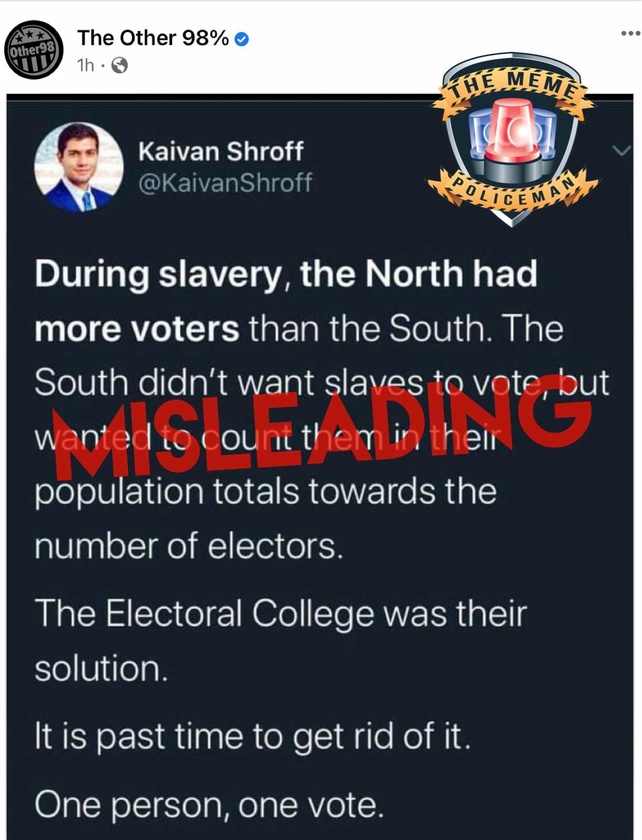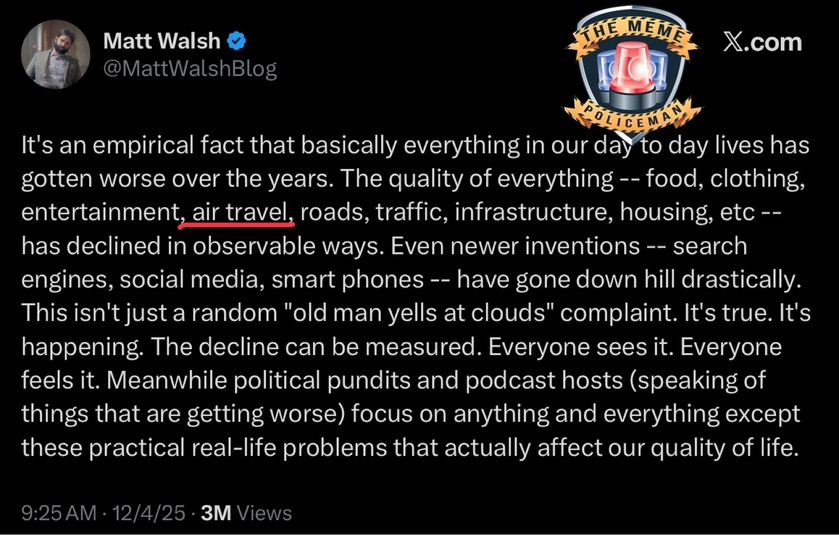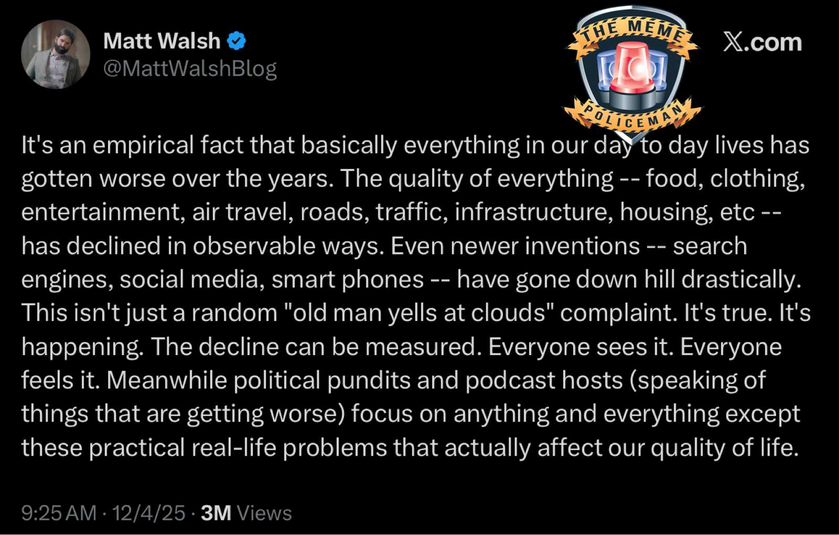This meme seems to circulate every year or so, and it’s back again, so here’s the rebuttal. It claims that the electoral college was the South’s idea and was implemented to help slave states. This is dubious at best.
▪️During the Constitutional Convention in 1787, there was significant division over how to elect the president. Initially, some delegates did propose a direct election by the people. This was championed by James Madison, a southerner, and two northerners (James Wilson and Gouverneur Morris).
▪️However, this proposal was roundly rejected by the convention, and not because of slavery. One of the most outspoken members against direct election was Elbridge Gerry of Massachusetts, who feared that demagoguery could result in a monarch in a direct election, a common fear at the time. Most of the delegates, north and south, preferred an indirect election of the president.
▪️Several proposals were then put forward. At first, a majority thought Congress should select the president. This was ultimately rejected because it was feared it would make the president too subservient to Congress. Other proposals included having state legislatures or governors elect the president. Alexander Hamilton even floated the idea of having a president for life.
▪️During the initial vote over having electors select the president, the only states voting “nay” were NC, SC and GA, the three most ardently proslavery states in the convention. Clearly it was not their idea or something they were clamoring for.
▪️When it first took shape, the Electoral College wouldn’t have helped the South significantly. Under the initial apportionment of the House, the slaveholding states would have held 39 out of 92 electoral votes, or about 42%. Based on the 1790 census, about 41% of the nation’s total white population lived in those same states, a tiny difference.
▪️The Electoral College eventually came out of the Brearly Committee, which included a cross section of the delegates, slightly weighted to northern states. It included David Brearly (NJ), Nicholas Gilman (NH), Rufus King (MA), Roger Sherman (CT), Gouverneur Morris (PA), John Dickinson (DE), Daniel Carroll (MD), James Madison (VA), Hugh Williamson (NC), Pierce Butler (SC) and Abraham Baldwin (GA).
▪️Once decided, the Electoral College was met with general satisfaction and received little resistance from the state ratifying conventions. Northerners and anti-slavery proponents defended it, like Alexander Hamilton did in Federalist No. 68. It was, perhaps naively, held up by most as a way to ensure virtuous people made the decision instead of the mob. As Hamilton put it, the EC was “most likely to possess the information and discernment requisite to such complicated negotiations.”
▪️Ironically, it was the anti-slavery John Quincy Adams who first benefited from the system, when he won despite losing the popular (and electoral) vote to Andrew Jackson in 1824 (the House decided the election since neither had a majority). It was pro-slavery Jackson who became one of history’s most prominent critics of the EC, lambasting it for preventing the people “to express their own will.”
▪️The EC made no difference in deciding the presidency during the 36 years before the Civil War. Except in 1860, Lincoln had 39.9% of the vote (in a 4 person race) but won a crushing victory in electoral votes. Many in the South ran the numbers and realized the North would be able to continually crush them with the EC and quickly stampeded to secession.
▪️There’s little evidence to suggest the EC was implemented over slavery. The reality was at the time few wanted a direct election of the president, the primary question was how to devise an indirect system. After much debate, they decided on each state getting the amount of electors equal to their representatives plus Senators, and few objected to that. But to change it now would require an amendment, which many would object to, making it extremely unlikely.
https://www.nytimes.com/2019/04/04/opinion/the-electoral-college-slavery-myth.html
https://www.archives.gov/publications/prologue/2006/spring/gerry.html
https://teachingamericanhistory.org/static/convention/themes/8.html
https://avalon.law.yale.edu/18th_century/fed68.asp
https://constitutioncenter.org/debate/special-projects/a-madisonian-constitution-for-all/essay-series/the-constitution-the-presidency-and-partisan-democracy-congress-revises-the-electoral-college-1804#_ftn2
https://www.nationalaffairs.com/publications/detail/in-defense-of-the-electoral-college
Support:
memepoliceman.locals.com
www.patreon.com/memepoliceman
Tip jar/requests:
https://memepoliceman.com/support-via-paypal/
Bitcoin:
3Kbnj6FFG5xCWKy5CFuQh3CFTkJjjMeqHi

So many of these right wing accounts are just whiners now, this is a diatribe about automatic sinks and towels, the horror! As I explained in a prior post, most of the newer terminals have great bathrooms, some now have completely private stalls and plenty of them. The worst and most crowded airport bathrooms are invariably found in aging terminals that are decades old. It’s a reminder that airports were usually drab and uncomfortable.
I think the heyday of the air hand-dryers was like 15-20 years ago, where often you couldn’t find real towels. Now you can at least usually get real paper towels in airport bathrooms. Remember those old cloth roller towels that would go in a loop and somehow “clean” themselves? Yuck! Public bathrooms have always been gross, it seems some are deliberately having selective memories.
Airport food and drinks were always expensive, but now practically everyone brings those huge cooler flasks with them and fills them up. So not sure what he means that ...

I first critiqued this terrible take by looking at how food has actually improved substantially. Even though I said the same could be done in every category, people said “you’re only doing food.” So let’s do air travel and see why it’s not gotten better, not worse.
▪️Aircraft have greatly improved. Just 15-20 years ago, many domestic routes (~15%) were flown by turboprops like the Brasilia, Dash 8 or Saab. Now, almost everything is in jets, and most aircraft have WiFi. Some even have Starlink, where you probably have faster WiFi than your home. Most major airlines offer dozens or hundreds of movies and shows to watch.
▪️Newer designs like the 787 have lower cabin altitudes and improved humidity, which make a huge difference in passenger comfort on long haul flights. The first/business class international market has gotten very competitive globally, with many carriers offering excellent service and amenities. Pods, suites, showers, etc. Coach still sucks but is dramatically cheaper ...

This is the complete opposite of an empirical fact. The right has now joined the left in being pessimistic about the modern world and completely unappreciative of the amazing abundance we now have. I’ll just focus on food here, but you could do it for almost every category.
▪️Fresh produce used to be available only in season. In the winter it was canned or frozen. People used to send fruit for Christmas gifts, it was that much of a luxury good. Now, you can get giant, sweet berries year around in every grocery store. Corn on the cob in February. Not to mention once rare items like dragon fruit, heirloom tomatoes or baby bok choy.
▪️If you didn’t live on the coast, seafood was either not available, frozen, or extremely expensive. If you lived in the Midwest and traveled to coastal locales you would quite literally be able to eat food you had never seen. Salmon has become much more abundant and accessible. You can get fresh ahi at Walmart today. Sushi and oyster bars exist everywhere ...













